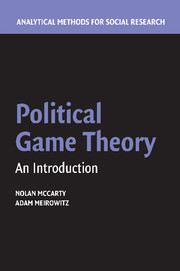Book contents
- Frontmatter
- Contents
- Acknowledgments
- 1 Introduction
- 2 The Theory of Choice
- 3 Choice Under Uncertainty
- 4 Social Choice Theory
- 5 Games in the Normal Form
- 6 Bayesian Games in the Normal Form
- 7 Extensive Form Games
- 8 Dynamic Games of Incomplete Information
- 9 Repeated Games
- 10 Bargaining Theory
- 11 Mechanism Design and Agency Theory
- 12 Mathematical Appendix
- Bibliography
- Index
4 - Social Choice Theory
Published online by Cambridge University Press: 05 June 2012
- Frontmatter
- Contents
- Acknowledgments
- 1 Introduction
- 2 The Theory of Choice
- 3 Choice Under Uncertainty
- 4 Social Choice Theory
- 5 Games in the Normal Form
- 6 Bayesian Games in the Normal Form
- 7 Extensive Form Games
- 8 Dynamic Games of Incomplete Information
- 9 Repeated Games
- 10 Bargaining Theory
- 11 Mechanism Design and Agency Theory
- 12 Mathematical Appendix
- Bibliography
- Index
Summary
The Open Search
In the pages that follow we consider a scenario that many readers of this book may soon encounter in their professional lives (if they have not already): the “open” faculty search. Consider a fictional, yet realistic, political science department whose membership is spread evenly across five subfields: American (A), comparative (C), international relations (I), theory (T), and formal theory/methods (F). The fictional university is having a mediocre year financially so the dean gives the department authorization for only one additional hire. This dean, unwilling to alienate any of the department's various factions, does not specify in which field the department should search, but tells the department, “Because you study politics you should be able to settle this fairly.” Those readers who have experienced a similar situation in their own departments should smile knowingly at the dean's folly.
Members of each subfield have homogeneous preferences over which field to hire. Indeed, each field has its own complete and transitive ordering over the fields. These rankings are given by Table 4.1.
Thus, Americanists find hiring an Americanist most desirable and hiring in international relations least desirable. So the department chair begins to decide how the department should decide. The first idea she entertains is having the department vote on the basis of plurality rule. Each member of the department is to cast a ballot for his favorite field and the one with the most votes wins.
- Type
- Chapter
- Information
- Political Game TheoryAn Introduction, pp. 66 - 86Publisher: Cambridge University PressPrint publication year: 2007

